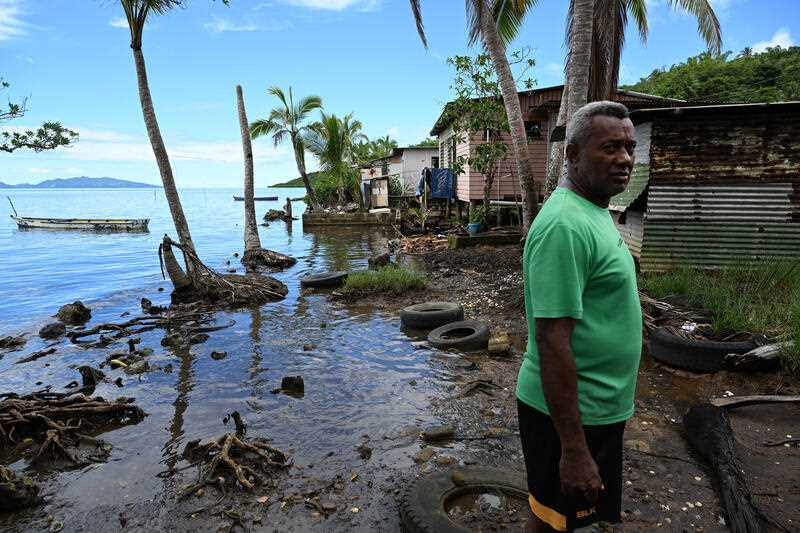Pacific politics isn’t quite as clear as the pristine oceans that surround the island nations and archipelagos.
The Albanese Labor government promised a diplomatic blitz to put relations with Australia’s closest neighbours back at the forefront of foreign policy.
Foreign Minister Penny Wong this week travelled to New Caledonia and Tuvalu and rounded off her first tour de expanse of the Pacific islands’ 800,000 square kilometres.
Her tenth trip to the Pacific means Senator Wong has visited all 17 other members of the Pacific Island Forum, which includes Australia.
The official opening of the embassy in French Polynesia last year also makes Australia the only nation to have a diplomatic presence in all 17 nations.
“Perhaps that is the clearest demonstration of our desire to listen to hear and to work with everyone in the region,” the foreign minister said during an address to New Caledonia’s Congress on Thursday.
But unlike the postcard view, the meetings weren’t against an innocuous backdrop.
Beijing’s emissaries have also been traversing the region after China managed to net a bilateral security deal with the Solomon Islands, although its push for a Pacific-wide security pact was rejected by the broader forum.
So as the foreign minister returns from her latest trip, Pacific Minister Pat Conroy will depart for Papua New Guinea before Anzac Day and attend commemorations in the capital Port Moresby.
The government is working to seal a new defence pact with Port Moresby this month and have the treaty signed in June.
“The Pacific should look to specific the Pacific family first for security aid and if there are any gaps in any individual country’s security should be filled by other countries in the Pacific,” Mr Conroy told AAP.
“That’s consistent with views of leaders in the region as articulated through the PIF.”
Whether deep sea mining should be allowed is another point of contention in the Pacific, with the additional concerns of Chinese companies holding exploration licences as access to critical minerals sparks a global race to shore up supply chains.
This was evident in Senator Wong’s trip to New Caledonia, where on top of financing for climate resilience and mitigation projects, she also spruiked the potential for stronger economic ties when it comes to clean energy.
New Caledonia’s nickel, which is used to create electric vehicle batteries, is being touted as a massive opportunity for Australian companies.
Senator Wong used her trip to announce six New Caledonian civil servants would travel to Australia to participate in an energy resources program to promote responsible mining practices.
“New Caledonia’s nickel is a critical mineral for the production of electric vehicle batteries and we are a world leader in some of the green technologies used to transform nickel into electric vehicle batteries,” she said.
“We hope that Australian investment and partnership becomes a bigger part of New Caledonia’s future.”
Green diplomacy has also increased under the Labor government, with ministers touting high emissions reduction targets as proof Australia is taking the existential threat of climate change for Pacific nations seriously.
Former Kiribati president Anote Tong is in the country to visit two Indigenous Australians who are bringing a landmark climate case to the federal government, arguing it breached its duty to protect the Torres Strait by failing to address climate change.
“These peoples, these communities really do not receive any kind of focus,” Mr Tong told AAP.
He said Australia’s move to net-zero emissions and increase in renewable energy was good, but the amount of fossil fuel being exported was still a concern.
“The reality is, Australia is benefiting from what is happening,” he said of the exports.
The former president also raised concerns about the rule of law in his home country with the government essentially suspending the judiciary.
“The judiciary remains of concern until today. The division of powers are vital to the process of democracy and the mass sacking of judges of the high court and judges of the court of appeal is unprecedented,” he said.
“That is a deep concern because once you don’t have those instruments, democracy begins to be unravelled.”
Concerns about the erosion of democracy in the Solomons also remain after the country’s election was pushed back.
Mr Conroy insists Australia will continue to support democracy in the region.
“We conduct our foreign policy according to our values and part of that is promoting democracy and the rule of law,” he said, pointing to Australia funding Papua New Guinea’s election and the Solomon Islands accepting a similar request for when its poll is held.
“We were able to do that while having respect for engagement with people. What we won’t do is result to megaphone diplomacy.”
The United States and United Kingdom have also turned an unprecedented amount of diplomatic capital towards the region in recent months.
The UK foreign secretary did a historic visit to the Pacific this week with a focus on putting regional voices first after a colonial history.
“We were a colonial power, but what we have to remind people is that you know, in the intervening decades or indeed century in some cases, we are in a different place,” the UK High Commissioner to Australia Vicki Treadell said.
“So listening and understanding what their challenges are and what is appropriate, in terms of supporting them, is where we are centred in our approach.”
Australia’s first lap of the Pacific is complete but as problems bubble beneath the surface, the government has made clear that treading water is not an option.
By Dominic Giannini in Canberra



